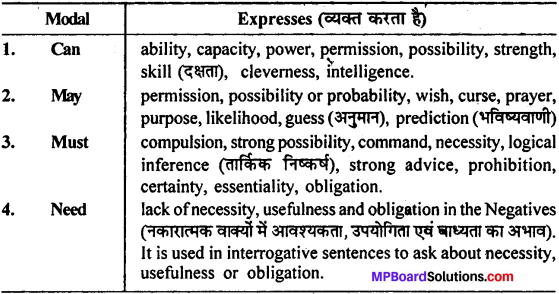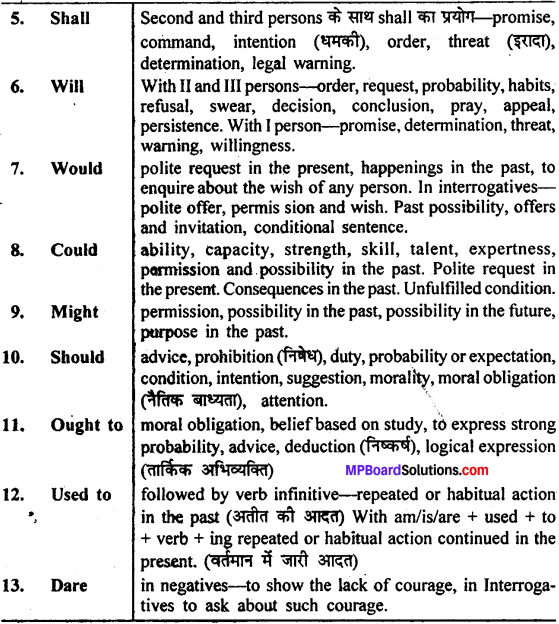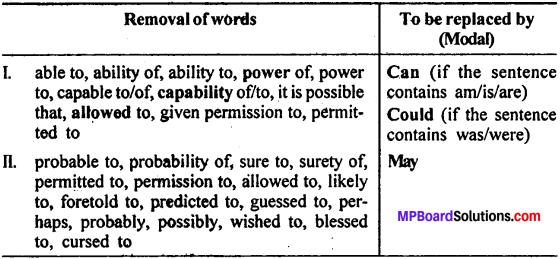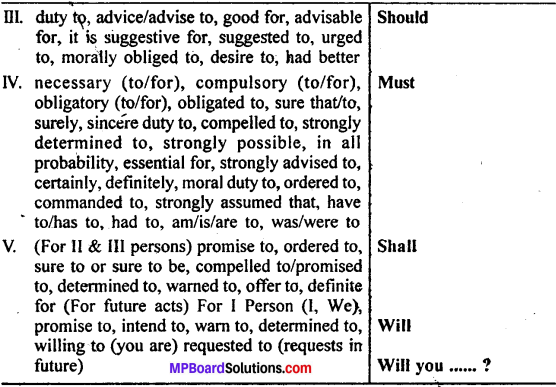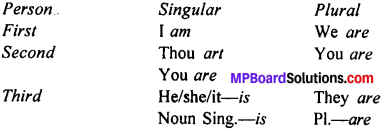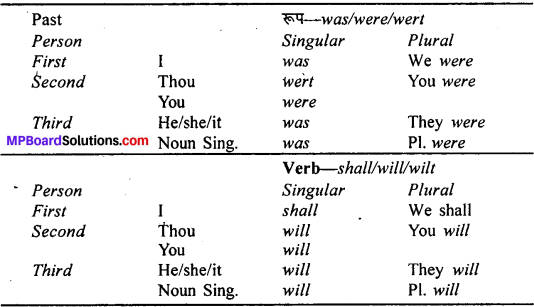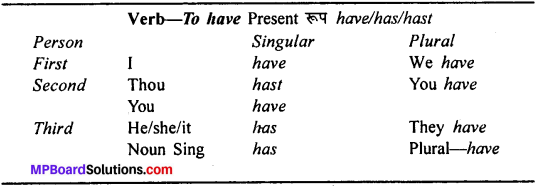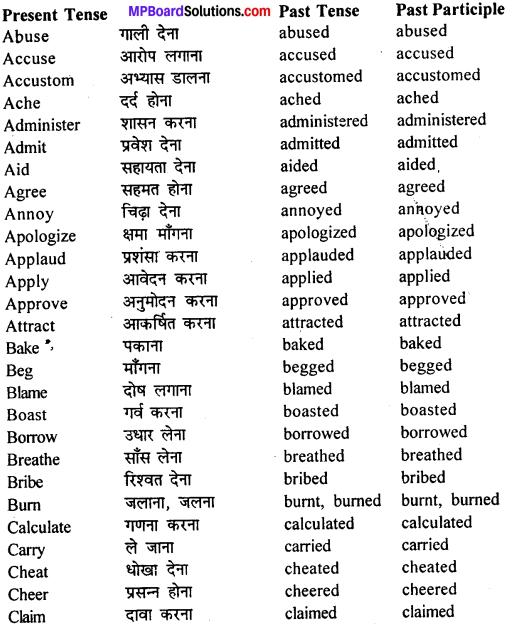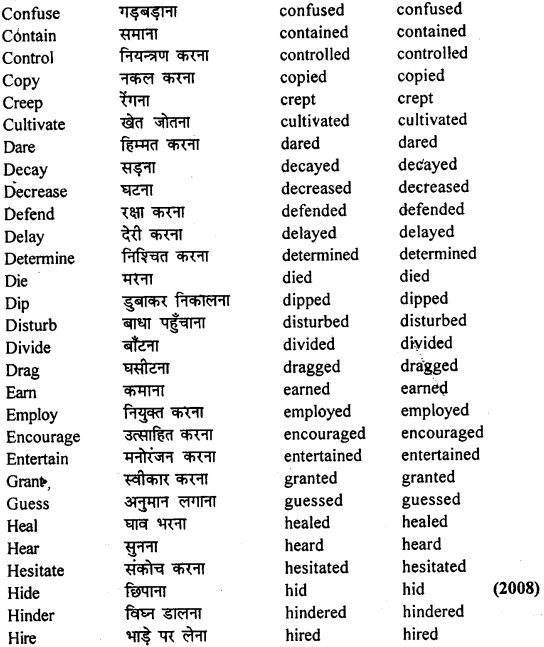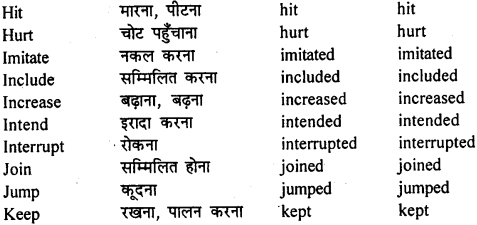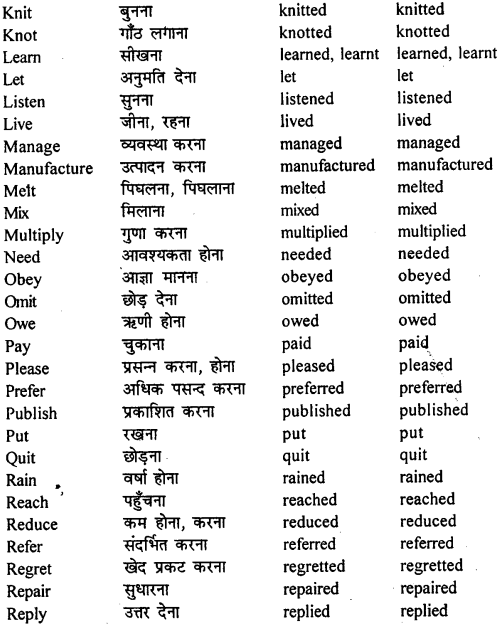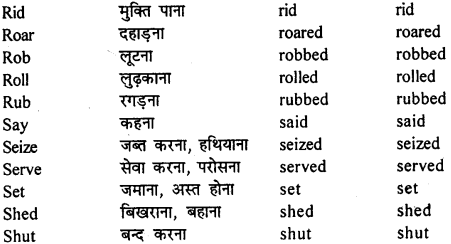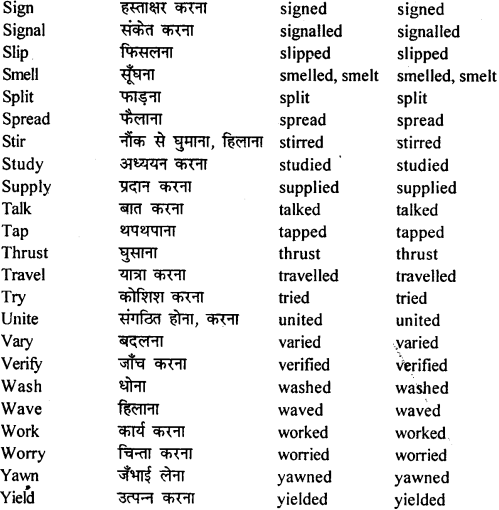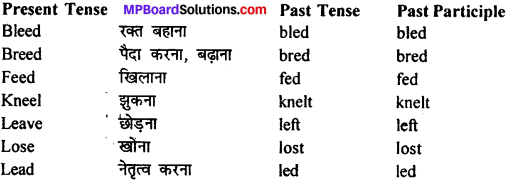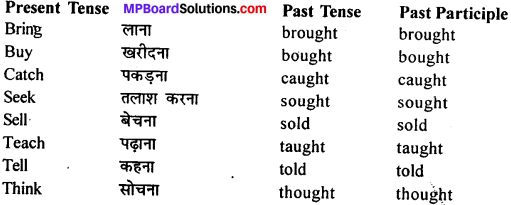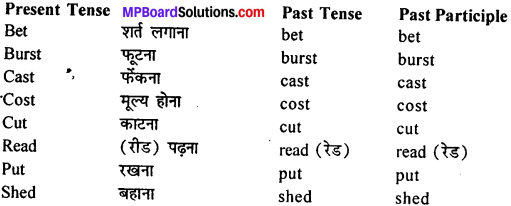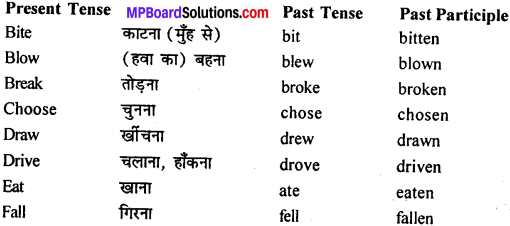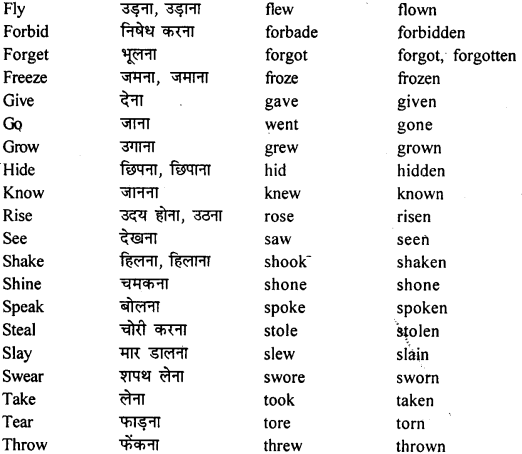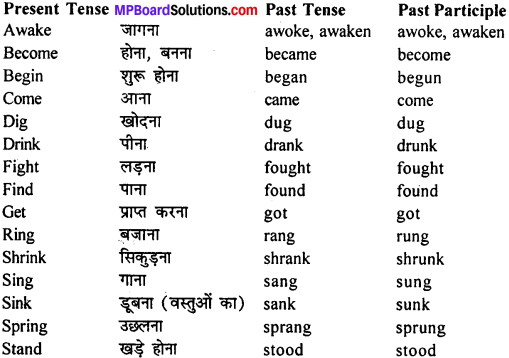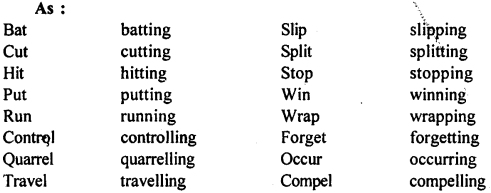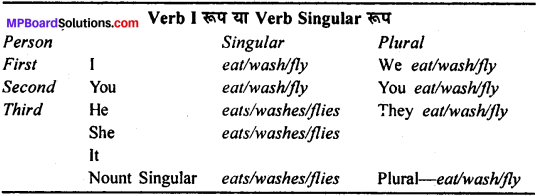Students who are studying 11th can get the free Madhya Pradesh Board Solutions for General English Grammar Complex Sentences Questions and Answers PDF here. You can download MP Board Class 11th English Solutions Questions and Answers PDF on this page. Practice questions of Mp Board Solutions of 11th English subject as many times as possible to get good marks.
MP Board Class 11th General English Grammar Complex Sentences
Gather chapter wise MP Board Solutions for 11th English Study Material to score the highest marks in the final exam. Various chapters and subtopics are given clearly in MP Board Class 11th English Solutions Objective Questions Questions and Answers Material. All the MP Board Solutions for 11th English Questions with detailed answers are provided by subject experts. The step by step MP Board Class 11th English Objective Questions and Answers guide will help you to enhance your skills in General English Grammar Complex Sentences. Here, along with the subject knowledge, General English Grammar Complex Sentences knowledge also plays an important role. So, students should download MP Board Solutions 11th English and read it to attempt all the questions with 100% confidence.
Complex Sentences – पिछले Chapter में हमने Sentences मात्र निरन्तरता के आधार पर Combine करना सीखा था। जब दो या दो से अधिक Simple Sentences इस प्रकार जोड़े जायें कि वे अपने अर्थ को पूरा करने के लिए परस्पर निर्भर हों, उनमें कोई विशेष सम्बन्ध हो तो ऐसे Simple Sentences जुड़कर एक Complex Sentence का निर्माण करते हैं। इनमें
(1) एक Principal या Main Clause होता है।
(2) शेष Subordinate Clauses कहलाते हैं।
(a) Noun clauses,
(b) Adjective या Relative clauses,
(c) Adverb clauses कहलाते हैं।
Note – Clause = जुड़ा हुवा Simple sentence !
Subordinating Conjunctions
(योजक शब्द)
(a) Simple Subordinators
Asm – after, although, as, because, before, if, since, that, though, till, until, unless, when, where, while, etc.
(b) Compound Subordinators so that, such that, as far as, as long as, as soon as, etc.
(c) Correlative Subordinators.
(इनका एक भाग एक जगह व दूसरा भाग दूसरी जगह जुड़ता है) –
If….then, although/though….yet, so…..as, so…..that, such…..that, such….as, same…..as, no sooner….than.
एक Complex sentence में कितने ही Simple sentences जुड़कर clauses कहलाते हैं
As –
(a) This man is a thief.
यह आदमी चोर है।
(b) This man entered the compartment.
इस आदमी ने कम्पार्टमेंट में प्रवेश किया।
(c) My brother caught him red-handed.
मेरे भाई ने इसे रंगे हाथों पकड़ा।
(d) My brother is an inspector.
मेरा भाई एक इंस्पेक्टर है।
Complex Sentence The man who entered the compartment is a thief whom my brother, who is an inspector, caught him red-handed.
यह आदमी जिसने कम्पार्टमेंट में प्रवेश किया एक चोर है, जिसे मेरे भाई ने जो एक इंस्पेक्टर है, रंगे हाथों पकड़ा।
Synthesis (संश्लेषण) – Simple sentences को जोड़कर Complex sentence बनाने को Synthesis कहते हैं। (उदाहरण – उपर्युक्त)
Analysis (विश्लेषण) – किसी Complex sentence को clauses में विभक्त करना Analysis Thesis
As –
उपर्युक्त Complex sentence को निम्न तरह से Analyse करेंगे :
(a) Principal clause – The man is a thief.
(b) Subordinate clause – _Who entered the compartment.
Relation – Relative (or Adjective) clause qualifying the noun ‘the man’ in (a).
(C) Subordinate clause – Whom my brother caught red-handed.
Relation – Relative clause qualifying the noun the thief in (a).
(d) Subordinate clause who is an inspector.
Relation—Relative clause qualifying the noun ‘my brother’ in (c).
Important Rules
Simple sentences को combine करते समय कुछ महत्त्वपूर्ण Rules का पालन करना होता है
Rule 1.
Principal clause किसीबी प्रकार का your fat (Assertive, Interrogative, Imperative, Optative या Exclamatory) हो सकते है-
As –
(a) Assertive — know that he is a fool.
(b) Interrogative –
(i) Do you know that he is a fool?
(ii) How do you know that he is a fool?
(c) Imperative – Give me the same book as I gave you.
(d) Optative – May his brother who has lost the control of theplane land safely.
(e) Exclamatory – How great a fool he is who thinks that he candecide the fate of others.
Rule 2.
किन्तु Subordinate clause केवल assertive ही होगा। यदि वह अन्य Toht for a H assertive that JIST GIMI
As –
(a) Assertive – I know that he is a fool.
(b) Interrogative
(i) He asks if father has taken tea. (Has father taken tea?)
(ii) He asks why father has not taken food.
(Why has father not taken food?)
(c) Imperative – The teacher advised me to get up early. (Get up early).
(d) Optative – He wished that I may win the election. (May you win the election).
(e) Exclamatory – He exclaimed that the scene was lovely. (How lovely the scene is?)
Rule 3.
Sentences जोड़ने पर Rule of Sequence of Tense का पालन करना होता है।
Rule Of Sequence Of Tense
English language में उपर्युक्त नियम तथा Sequence of Tenses का Rule अति – महत्त्वपूर्ण है। चूंकि ये दोनों नियम हिन्दी व्याकरण में नहीं हैं, अतः हम English में Kinds of Sentences का परिवर्तन तथा Tenses का सही उपयोग नहीं कर पाते या हमें उसे समझने में कठिनाई होती है।
Examples,
He informs me that his friend is leaving.
वह मुझे सूचित करता है कि उसका मित्र जा रहा है।
He informed me that his friend was leaving.
उसने मुझे सूचित किया कि उसका मित्र जा रहा है। (न कि जा रहा था)
The Principle
The Sequence of Tenses is the principle according to which the tense of the verb in a Subordinate clause follows the tense of the verb in the Principal Clause.
काल अनुक्रम वह सिद्धान्त है जिसके अनुसार किसी Complex sentences के Subordinate clause/clauses ont Verb/Verbs at Tense, Principal Clause it Verb की Tense का अनुगमन करती है।
Rule 1.
A Present or Future Tense in the Principal Clause may be followed by any tense required by the sense of the Subordinate clause.
यदि Principal Clause की Verb Present Tense या Future Tense में हो तो Subordinate Clause की Verb उसके अर्थ के अनुसार किसी भी Tense की हो सकती है, उसमें किसी परिवर्तन की आवश्यकता नहीं होती।
Examples
- Principal Clause – Subordinate Clause
- You know – that he is doing right.
- You know – that he was doing right.
- He says – that he will go there.
- You will find – that she works well.
- I shall tell you – what I can do.
Rule 2.
किन्तु यदि Principal clause की Verb Past Tense की हो तो उसके अनुसार Subordinate clause की Verb को निम्नानुसार परिवर्तित करना होगा
(a) यदि Subordinate clause की Verb Present Tense में है तो उसे Past Tense में परिवर्तित कर प्रयोग करना होगा।
(b) यदि Subordinate clause की Verb Past Tense में हो, तो निम्नानुसार परिवर्तित होगा :
- Original (मूल) – Change (परिवर्तन)
- Past Indefinite – Past Perfect
- Past Continuous – Past Perfect Continuous
- शेष में – कोई परिवर्तन नहीं।
(c) Subordinate clause a Verb Future Tense Ft Future Tense के Modal, Auxiliary, shall/will को should/would…… में परिवर्तित कर प्रयोग लायेंगे।
(d) अन्य Modal Auxiliaries का Past Tense प्रयोग में लायेंगे।
Examples-
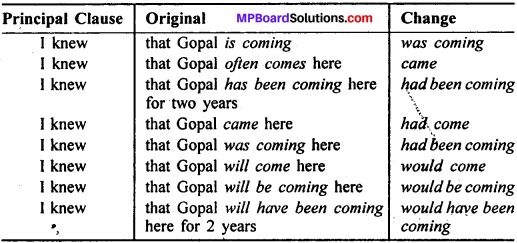
Note : उपर्युक्त उदाहरण, उदाहरणार्थ ही हैं।
Special Rule
उपर्युक्त Rule 2 के अपवादस्वरूप तीन मुख्य नियम हैं।
Rule 3.
(Exception to Rule 2) नियम 2 का अपवाद –
A Past Tense in the Principal clause may be followed by a Present Tense in the Subordinate clause when the Subordinate clause expresses some universal truth.
यदि किसी Subordinate clause में कोई सर्वाभौम सत्य प्रकट किया गया हो तो उसके Present Tense को यथावत रखा जा सकता है भले ही Principal clause की Verb Past Tense की हो।
Examples :
1. The teacher taught us that the earth is round.
शिक्षक ने हमें सिखाया कि पृथ्वी गोल है।
2. The king said that all men are mortal.
राजा ने कहा कि सभी मनुष्य नश्वर हैं।
3. He learnt from his experience that pride has a fall.
उसने अपने अनुभव से सीखा कि गर्व का पतन होता है।
4. Galileo proved that the earth moves round the Sun.
गैलिलिओ ने सिद्ध किया कि पृथ्वी सूर्य का चक्कर लगाती है।
5. The teacher taught us that the three angles of a triangle are equal to two right angles.
शिक्षक ने हमें सिखाया कि किसी त्रिकोण के तीनों कोणों का योग दो समकोण के बराबर होता है।
Rule 4.
When the Subordinate clause is introduced by the conjunction of comparison ‘than’, then Rule 2 does not apply at all.
जब कोई Subordinate clause conjunction ‘than’ से प्रारम्भ होता है तब कोई – सा भी Tense किसी भी Tense के बाद आ सकता है।
Examples :
Principal clause – Subordinate clause.
1. She likes you better than she likes me.
वह जितनी अच्छी तरह से मुझे चलती है उससे ज्यादा अच्छी तरह तुम्हें चाहती है।
2. She liked you better than she likes me.
3. She will like you better than she has liked me.
4. She has liked you better than she liked me etc.
Note : Comparison यदि as well as से प्रकट हो, तो यही नियम लागू होता है।
As –
1. She likes he as well as she liked him.
वह मुझे उसी प्रकार चाहती है जैसे व उसे चाहती थी।
2. She likes me as well as she likes him.
वह मुझे व उसे समान रूप से चाहती है।
Rule 5.
(A) जब Adverb Clause of Purpose, Principal clause से जोड़ा जाय तथा Principal clause की verb Present अथवा Future में हो, तो Subordinate clause verb may’ (Present Tense) में प्रकट की जानी चाहिए।
e.g. –
1. He works hard so that he may pass.
वह श्रम करता है ताकि वह सफल हो सके।
2. He will work hard so that he may pass.
वह श्रम करेगा ताकि वह सफल हो सके।
(B) किन्तु यदि Principal Clause की Verb Past Tense में हो, तो Subordinate clause ‘might’ (Past Tense) का प्रयोग किया जाना चाहिए।
e.g. –
1. He worked hard that he might pass.
उसने श्रम किया ताकि वह सफल हो सके।
2. He was working hard that he might pass.
वह श्रम कर रहा था ताकि वह सफल हो सके।
(C) यदि Subordinate clause का प्रारम्भ Conjunction – lest (अन्यथा) से प्रारम्भ हो तो Subordinate clause में modal – should का प्रयोग किया जाता है भले ही Principal clause किसी भी Tense का हो।
e.g. –
1. She works hard lest she should fail. (= She may not fail.)
वह श्रम करती है ताकि वह असफल न हो।
2. She worked hard lest she should fail. (= She might not fail.)
3. She will work hard lest she should fail. (= She may not fail.)
Subordinate Clauses
जैसा कि हम पूर्व में जान चुके हैं, Complex Sentence Simple Sentences का एक ऐसा Group है जो दूसरे से घनिष्ठ रूप से सम्बन्धित होते हैं। जुड़ जाने के बाद ये Clauses कहलाते हैं तथा मुख्य Simple Sentence जिसमें अन्य Simple Sentences जुड़ते हैं Principal Clause कहलाता है। जुड़ने वाले Simple Sentences को Subordinate clauses कहा जाता है। सभी Subordinate clauses प्रत्यक्षतः या अप्रत्यक्षत: Principal Clause से जुड़े होते हैं किन्तु Principal Clause किसी से जुड़ा नहीं होता है, वह स्वतन्त्र होता है। Subordinate Clause के प्रारम्भ में सामान्यतः एक Conjunction होता है किन्तु Principal Clause के पूर्व नहीं।
प्रत्येक Subordinate clause किसी Principal clause या अन्य Subordinate clause से जुड़कर
1. Noun का
2. Adjective का या
3. Adverb का कार्य (Function) करता है।
A. Noun Clauses,
B. Adjective या Relative clauses,
C. Adverb clauses हम प्रारम्भिक तौर पर ऐसे Complex Sentences का अध्ययन करेंगे जिनमें दो clauses हों। किसी Complex Sentence में ये तीनों प्रकार के clauses कितनी भी संख्या में हो सकते हैं। यहाँ हम clauses का सरल से कठिन के क्रम में अध्ययन करेंगे।
Adverb Clauses
कोई Adverb सामान्यतः (Functions) करती है
1. किसी Verb को modify करना (अर्थात् उसके हाने का समय, स्थान, तरीका इत्यादि बताना)
As –
(1) He came early.
(2) Pratap fought bravely.
2. किसी Adjective को modify करना (अर्थात् उसके अंशो को बताना या तुलना करना।)
As—
Pratap is very brave.
3. किसी Adverb को modify करना (अर्थात् उसके अंशो को बताना या तुलना करना)
As –
He walked very slowly.
जब कोई Simple sentence अन्य Simple sentence में जुड़कर उपर्युक्त में से कोई कार्य करे तो उसे Adverb clause कहेंगे।
1. Adverb Clauses Of Reason
निम्न simple sentences को देखिये As – Hari did not go to school.
हरी विद्यालय नहीं गया।
He was ill.
वह बीमार था।
इन्हें because से जोड़कर यह complex sentence बनाया।
Hari did not go to school because he was ill.
हरी विद्यालय नहीं गया क्योंकि वह बीमार था।
क्यों नहीं गया? क्योंकि वह बीमार था।
अत: complex sentence :
Hari did not go to school because he was ill.
चूँकि Because he was ill वाला भाग (clause) प्रथम भाग की did not go verb के होने का कारण बतलाता है यह Adverb clause of Reason कारण सूचक उपवाक्य तथा प्रथम भाग Hari did not go to school – principal clause कहलाता है।
Other Examples
Note – 1. कुछ में पहले Principal clause व Adverb clause बाद में व कुछ में Adverb clause पहले व Principal clause बाद में आता है। इन्हें नोट करें। Conjunction से जुड़ा clause Adverb clause होता है।
2. Principal clauses की जिस verb को यह modify (कारण बताने का काम) करता है उसे हमने bold में रखा है।
Conjunctions – Because, as since, for = क्योंकि।
As –
1. He failed in the examination.
He fell ill at that time.
He failed in the examination because he fell ill at that time.
वह परीक्षा में असफल हुआ क्योंकि वह उस समय बीमार पड़ गया था।
2. Some persons pulled the chain several times.
The train became late.
As some persons pulled the chain several times the train became late.
क्योंकि कुछ व्यक्तियों ने कई बार चेन खींची ट्रेन देरी से हो गई।
3. Suresh was under age.
Suresh could not be selected for the match.
Since Suresh was under – age, he could not be selected for the match.
चूँकि सुरेश की उम्र कम थी, अत: मैच के लिए वह चुना नहीं जा सका।
4. We had taken brightest torches for it was the darkest night.
हमने अपने साथ अत्यन्त प्रकाशवान टार्चे ले ली थी क्योंकि वह अत्यन्त अँधेरी रात थी।
5. Mother could not break the stick.
The stick was very hard.
Mother could not break the stick because it was very hard.
माँ लकड़ी को तोड़ नहीं सकी क्योंकि वह बहुत कठोर थी।
6. He locked Delilah up in the coal celler.
The celler had a cement floor and two feet thick granite walls.
He locked Delilah up in the coal celler for it had a cement floor and two feet granite walls.
उसने डेलिला को कोयले की कोठरी में बन्द किया क्योंकि उसमें सीमेण्ट का फर्श व दो फुट मोटी चूने की दीवारें थीं।
Exercise :
1 Combine the Sentences :
- I will not take food.
I suffer from stomach – ache. (because) - Will you wait here for some time?
I have some important work to do. (as) - I am ready to believe.
You say so. (since) - We had to stay there.
It was raining heavily. (for) - He failed.
He did not work hard. (because) - The teacher cannot teach.
The teacher suffer from cold. (since). - I will not come today.
Some guests have arrived. (because)
2. Adverb Clauses Of Time
निम्न simple sentences ont fait को देखिए
As –
Father called me.
I was taking food. [2014]
इन्हें when = जब conjunctions जोड़ा।
Father called me when I was taking food.
पिताजी ने मुझे बुलाया जब मैं भोजन कर रहा था।
When called? When I was taking food.
कब बुलाया? जब मैं भोजन कर रहा था।
अत : clause – When I was taking food दूसरे clause की verb ‘called’ के होने का समय (Time) बतलाता है अतः यह Adverb clause of Time कहलाया।
जब कोई Simple sentence किसी अन्य Simple sentence में जुड़कर उसकी Verb के होने का समय बताए तो उसे Adverb Clause of Time कहते हैं।
Conjunctions – When, as = जब, Whenever = जब कभी, While = जबकि, Since = से, Before = पहले, After = बाद में, As soon as = जैसे ही, No sooner…than = जैसे ही, As long as = जब तक, Till = तक etc.
As –
1. My son runs to the door.
He hears somebody knocking.
My son runs to the door when he hears somebody knocking.
मेरा पुत्र दरवाजे पर दौड़ा जाता है जब वह किसी के खटखटाने की आवाज सुनता है।
2. A stone hit me.
I was coming out.
As I was coming out a stone hit me.
जब मैं बाहर आ रहा था तो मुझे एक पत्थर लगा।
3. The girl found the ring.
She was sweeping the room.
The girl found the ring while she was sweeping the floor.
लड़की को अंगूठी मिली जब वह फर्श का झाड़ लगा रही थी।
4. He pays us a visit.
He comes here.
He pays us a visit whenever he comes here.
वह जब कभी यहाँ आता है हमसे मुलाकात करता है।
5. We had reached the station.
The train arrived.
We had reached the station before the train arrived.
ट्रेन के आने से पूर्व हम स्टेशन पहुँच चुके थे।
6. We reached the station.
The train had arrived.
We reached the station after the train had arrived.
ट्रेन के आगमन के पश्चात् हम स्टेशन पहुंचे।
7. I have not met him.
He came to live here.
I have not met him since he came to live here.
वह यहाँ रहने आया तब से मैं उससे नहीं मिला हूँ।
8. The sun rises.
I take bath.
As soon as the sun rises, I take bath.
जैसे ही सूर्योदय होता है, मैं स्नान कर लेता हूँ।
9. He came here.
I rushed to see him.
No sooner did he come here, than I rushed to see him.
वह यहाँ आया नहीं कि मैं उससे मिलने दौड़ पड़ा।
10. There is unity in the country.
We shall remain strong.
As long as there is unity in the country, we shall remain strong.
देश में जब तक एकता रहेगी, हम ताकतवर बने रहेंगे।
Exercise : 2
Combine the Sentences :
1. I found the house locked.
I reached home. (When)
2. I heard a knock at the door.
I was naving a bath at that time. (While)
3. The thief ran away.
He saw the police approaching. (As soon as)
4. The teacher entered the room.
Boys became quiet. (No sooner…..than)
5. The sun rose.
I had taken bath. (Before)
6. Mahesh came to the class.
The teacher had taken roll call. (After)
7. She has been weeping.
She came to know her result. (Since)
8. Piere Curie was run over by a car.
He was crossing the road. (As)
9. You can work here.
I trust you. (As long as)
10. He had been living there.
He took birth. (Since)
3. Adverb Clauses Of Place
निम्न simple sentences को देखिए
As –
He has gone.
From where no one returns.
जोड़ेने पर – He has gone from where no one returns.
वह वहाँ चला गया है जहाँ से कोई नहीं लौटता।
where (कहाँ) चला गया है ? From where no one returns. जहाँ से कोई नहीं लौटता।
अर्थात् where no one returms – clause verb ‘has gone’ की place बतलाता है। अतः यह Averb clause of place कहलाता है। जब एक Simple Sentence दूसरे Simple Sentence में इस तरह जुड़े कि जडकर वह उस Verb के होने का स्थान बतलाए तो उसे Adverb Clause of Place कहते हैं।
Conjunctions – Where = जहाँ, Wherever = जहाँ कहीं, Whence = जहाँ से, Whither = किस स्थान को।
As –
1. There can be no life.
There is no water.
Where there is no water, there can be no life.
जहाँ पानी न हो वहाँ जीवन नहीं हो सकता।
2. Arrest him.
He is found.
Arrest him wherever he is found.
वह जहाँ कहीं भी मिले उसे गिरफ्तार कर लो।
3. Return to the place.
You came from the place.
Return whence you came.
तुम जहाँ से आये हो वहीं लौट जाओ।
4. Do not go to the place.
You are not welcomed.
Do not go where you are not welcomed.
जहाँ तुम्हारा आदर न हो वहाँ मत जाओ।
5. The air bloweth.
It listeth.
The air bloweth whither it listeth. (= The air blows whither it lists.)
हवा जहाँ चाहे वहाँ जा सकती है।
Exercise : 3
Combine the Sentences :
1. You may go.
You like. (Wherever)
2. She wishes to tell her story.
There is nobody to understand her. (Where)
3. They sowed seeds.
The earth is soft. (Where)
4. Your father is digging the earth.
He hopes to find water. (Where)
5. Row brothers row.
The sky and the sea seem to meet. (Where)
4. Adverb Clauses Of Purpose
निम्न simple sentences देखिए के
As –
He worked hard.
He may get success.
इन्हें so that से जोड़ा तो निम्न complex sentence बना।
He worked hard so that he may get success.
उसने कठिन मेहनत की ताकि वह सफलता प्राप्त कर सके।
With what purpose? – worked hard किस उद्देश्य से?
So that he may get success.
चूँकि यह clause मुख्य clause की Verb के होने या करने का उद्देश्य (purpose) बतलाता है, अतः यह Adverb Clause of Purpose – modifying the verb ‘worked’ कहलाता है। जब एक Simple Sentence दूसरे Simple Sentence में इस तरह जोड़ा जाए कि जुड़कर वह दूसरे Simple Sentence की Verb के होने का उद्देश्य बताए तो उसे Adverb Clause of Purpose कहते हैं।
Conjunctions – So that = ताकि, that = ताकि, in order that = ताकि, lest = अन्यथा, ऐसा न हो कि
As –
1. Let us take a taxi.
We may reach the station in time.
Let us take a taxi so that we may reach the station in time.
हम एक टैक्सी कर लें, ताकि हम स्टेशन समय पर पहुँच सकें।
2. The players practised continuously.
They might win the match.
The players practised continuously in order that they might win the match.
खिलाड़ियों ने निरन्तर अभ्यास किया ताकि वे मैच जीत सकें।
3. Walk carefully.
You should stumble.
Walk carefully lest you should stumble.
सावधानी से चलो अन्यथा (ऐसा न हो कि) तुम लड़खड़ा जाओगे।
Exercise : 4
Combine the Sentences :
1. Obey the rules of the road.
You may not collide with someone. (so that)
2. Amit took two tuitions.
He might get money for his fees. (in order that)
3. She paid full attention to cooking.
She may get praise from guests. (that)
4. Take fresh food.
You should become ill. (lest)
5. The passenger ran fast.
He might catch the bus. (so that)
6. We obey the traffic rules.
There may not be any accident.
7. People should pay taxes honestly.
The government can work to develop the country.
5. Adverb Clauses Of Manner
निम्न simple sentences को देखिये
As –
I shall play the match.
I like.
इन्हें as से जोड़कर निम्न complex sentence बनाया
I shall play the match as I like.
मैं जैसे चाहूँगा मैच खेलूँगा।
यहाँ as I like, subordinate clause, Main clause की verb ‘shall play’ को तरीका (manner) बताकर modify करता है, अत: यह Adverb clause of manner कहलाता है।
जब कोई Simple Sentence किसी अन्य Sentence में इस तरह जुड़े कि वह उसकी Verb का होने का तरीका प्रकट करे तो उसे Adverb Clause of Manner कहते हैं।
As—
1. You may do this work.
You please in the way.
You may do this work as you please.
तुम इस कार्य को जैसा चाहो कर सकते हो।
2. Can you solve this problem?
Solve this problem as required.
Can you solve this problem as required?
क्या तुम इस समस्या को जैसा वांछनीय है इस प्रकार हल कर सकते हो?
3. Run quickly.
Run with your full capacity.
Run as quickly as you can.
जितना तेज दौड़ सकते हो दौड़ो।
4. The painter painted the house.
We showed him the way.
The painter painted the house as we showed him.
पेण्टर ने घर उसी प्रकार पेण्ट किया जैसा हमने उसे बताया था।
Exercise : 5
Combine the Sentences :
1. The workers did the work.
The manager directed. (as)
2. Why can’t she dance in that way?
Her dance master showed her the way. (as)
3. Pratap fought bravely.
He fought bravely as per hiş capacity.
4. The students solved the question.
The way was shown by the teacher.
5. Write the letters.
Write neatly to your full ability.
6. Adverb Clauses Of Condition
निम्न simple sentences को देखिये
As—
You work hard.
You will get success.
इन्हें if conjunction से जोड़ा तो निम्न complex sentence बना।
If you work hard, you will get success.
यदि तुम कठिन मेहनत करोगे, तो तुम्हें सफलता प्राप्त होगी।
उपर्युक्त वाक्य में will get (सफलता) मिलेगी, इस शर्त पर कि तुम कठिन मेहनत करोगे।
अत: If you work hard शर्त (condition) सूचक उपवाक्य कहलायेगा व Main clause की verb ‘will get’ को modify करेगा।
जब एक Simple Sentence दूसरे Simple Sentence में इस तरह जुड़े कि जुड़कर वह उस Sentence की Verb की शर्त हो तो वह Adverb Clause of Condition कहलाता है।
Conjunction – If = यदि, Unless = If not यदि नहीं, In case = उस परिस्थिति में, Provided (that) = बशर्ते।
As –
You know the formulas (formulae).
You can solve this problem.
If you know the formulas, you can solve this problem.
यदि तुम्हें सूत्र ज्ञात हो तो तुम इस समस्या को हल कर सकते हो।
2. We will have bumper crops.
It rains in winter.
We will have bumper crops, if it rains in winter.
हमें बहुत बढ़िया फसल मिलेगी यदि शीत ऋतु में वर्षा होगी।
3. You are not honest.
People will not respect you.
If you are not honest, people will not respect you.
(= Unless you are honest, people will not respect you.)
यदि तुम ईमानदार नहीं होंगे तो लोग तुम्हारा आदर नहीं करेंगे।
4. Ravi would not have failed.
He had given proper attention to his studies.
Ravi would not have failed, if he had given proper attention to his studies.
(or = Had Ravi given full attention to his studies, he would not have failed.)
यदि रवि ने अध्ययन पर उचित ध्यान दिया होता तो वह अनुत्तीर्ण नहीं होता।
5. Take the advice of Mr. Prasad.
I am not available.
In case I am not available, take the advice of Mr. Prasad.
मेरी अनुपस्थिति की दशा में मिस्टर प्रसाद से सलाह लेना।
6. I shall give you a cash prize.
You get 75% of marks.
I shall give you a cash prize, provided that you get 75% of marks.
मैं तुम्हें नकद इमान दूंगा बशर्ते तुम 75% अंक प्राप्त करो।
7. He asks forgiveness.
I shall not give him his salary.
Unless he asks forgiveness, I shall not give him his salary.
(or = If he does not ask forgiveness, I shall not give him his salary.)
यदि वह क्षमा नहीं माँगेगा तो मैं उसे उसका वेतन नहीं दूंगा।
8. I shall mark you absent.
You come late.
I shall mark you absent, if you come late.
(or = I shall mark you absent, unless you come in time.)
यदि तुम देरी से आये तो मैं तुम्हारी गैरहाजिरी लगा दूंगा
9. Tom had been given money.
He would have wasted it.
If Tom had been given money, he would have wasted it.
यदि टॉम को धन दिया जाता तो वह उसे व्यर्थ खर्च कर देता।
10. Kamala would have danced.
The doctor had attended her.
Kamala would have danced, had the doctor attended her.
यदि डॉक्टर ने कमला की देखभाल की होती तो कमला नृत्य करती।
Exercise : 6
(A) Combine the Sentences :
1. The patient will not become healthy.
He takes medicine. (Unless)
2. He had informed me.
I would have stayed there. (If)
3. You want to become lawyer.
You must study law. (If).
4. I like tea.
It is hot. (Provided)
5. The judge will not believe.
You prove it. (Unless)
6. I hear the knock.
I shall go to the door. (In case)
7. You don’t ring the bell.
The servant will not come. (If)
8. Father will not attend the party.
He is invited. (Unless)
9. The king will take up your charges.
You have plenty of proof. (In case)
10. They will stay here.
You make nice arrangements. (Provided)
(B) Rewrite using ‘Unless’ in place of ‘if :
1. If he comes, I will go there. [2010]
2. You will not be admitted, if you don’t pay fees.
3. The bus will start running, if there are sufficient passengers.
4. If she doesn’t stop talking, she will be removed from this place.
5. If you come to me, I will help you. [2011]
7. Adverb Clauses Of Result Or Effect
Simple sentences के निम्न pairs देखिये –
As –
1. The stick is very soft.
I can bend it easily.
2. The stick is very hard.
I cannot bend it.
इन्हें so …… that से जोड़ने पर निम्न complex sentences तैयार होंगे।
1. The stick is so soft that I can bend it easily.
लकड़ी इतनी नरम है कि मैं इसे आसानी से मोड़ सकता हूँ।
2. The stick is so hard that I cannot bend it.
लकड़ी इतनी कठोर है कि मैं इसे मोड़ नहीं सकता।
कितनी नरम या कठोर?
कि उसे मैं मोड़ सकता हूँ। नहीं मोड़ सकता।
अत: clauses—50 ……. that I can bend it easily.
SO ……. that I cannot bend it.
Adjectives soft व hard के result या effect (परिणाम) को बतलाते हैं।
अत: Adjectives को modify करने वाले Adverb clauses of Result या effect कहलाते हैं।
अब निम्न pairs को देखिए
As –
1. It is a soft stick.
I can bend it easily.
ऊपर के sentence में soft का प्रयोग predicative था यहाँ attributive है। अतः इन्हें such ….. that से जोड़ेंगे।
It is such a soft stick that I can bend it easily.
यह एक ऐसी नरम लकड़ी है कि मैं इसे आसानी से मोड़ सकता हूँ।
जब कोई Simple Sentence किसी अन्य Simple Sentence में इस प्रकार जुड़े कि जुड़कर वह दूसरे Sentence के किसी Adjective या Adverb को Modify करते हुए उसके परिणाम को बनाए तो उसे Adverb Clause of Result or Effect कहते हैं।
Conjunctions—So…..that या Such……that.
(A) Adjectives
As –
1. Akbar’s memory was very remarkable.
He could keep a lot of facts in his mind.
Akbar’s memory was so remarkable that he could keep a lot of facts in his mind.
अकबर की याद्दाश्त इतनी तीव्र थी कि वह बहुत सारे तथ्यों को दिमाग में रख सकता था।
2. The question is very easy.
I can solve it quickly.
The question is so easy that I can solve it quickly.
प्रश्न इतना सरल है कि मैं उसे जल्दी हल कर सकता हूँ।
3. His father was very patient.
He could bear troubles calmly.
His father was so patient that he could bear troubles calmly.
उसके पिता इतने धैर्यवान थे कि वे कठिनाइयों को शान्ति से सहन कर सकते थे।
4. Malwa’s climate is very pleasant.
One feels much happiness.
Malwa’s climate is so pleasant that one feels much happiness.
मालवा की आबोहवा इतनी मस्त है कि व्यक्ति प्रसन्नता महसूस करता है।
5. Vikram was very just.
Everyone was satisfied with his judgement.
Vikram was so just that everyone was satisfied with his judgment.
विक्रम इतना न्यायशील था कि प्रत्येक व्यक्ति उसके न्याय से सन्तुष्ट था।
6. He has a very good personality.
Everyone is impressed with him.
He has such a good personality that everyone is impressed with him.
उसका व्यक्तित्व इतना अच्छा है कि हर व्यक्ति उससे प्रभावित है।
7. It is a very difficult situation.
He has become hopeless.
It is such a difficult situation that he has become hopeless.
यह एक इतनी कठिन स्थिति है कि वह निराश हो गया है।
8. His father is very weak.
He cannot walk.
His father is so weak that he can’t walk.
उसके पिताजी इतने कमजोर हैं कि चल नहीं सकते।
9. The box is very heavy.
This boy can’t move it.
The box is so heavy that this boy can’t move it.
यह बक्सा इतना भारी है कि यह बालक इसे हटा नहीं सकता।
10. I am very much perturbed.
I am unable to think.
I am so much perturbed that I am unable to think.
मैं इतना परेशान हूँ कि मैं सोचने में असमर्थ हूँ।
Exercise : 7
A. Combine the Sentences with so…..that or such……that :
1. Pratap was very brave.
He could fight with many persons alone.
2. His brother is very tall.
He can touch the ceiling.
3. This cloth is very fine.
I like it very much.
4. She had a very lovely face.
Everyone was attracted by it.
5. Mr. Gupta had very bad habits.
All hated him.
6. His father is very fat.
He cannot move easily.
7. The food is very dry.
It cannot be swallowed easily.
8. The inangoes are very sour.
I cannot eat them.
9. Gopal was very sad.
He was unable to enjoy the party.
10. Jagannath was very miser.
He did not spend sufficient money.
B. अब निम्न pairs को देखिए
1. The teacher spoke very loudly.
We could hear him easily.
2. The teacher spoke very slowly.
We couldn’t hear him properly.
इन्हें so …. that से जोड़ने पर निम्न complex sentences बनेंगे।
1. The teacher spoke so loudly that we could hear him easily.
शिक्षक इतने जोर से बोले कि हम उन्हें आसानी से सुन सके।
2. The teacher spoke so slowly that we could not hear him properly.
शिक्षक इतने धीमे बोले कि हम उन्हें ठीक तरह से सुन न सके।
कितने जोर से या धीमे से?
कि हम उन्हें सुन सके/नहीं सुन सके।
यहाँ …..” कि हम उन्हें सुन सके/न सुन सके से Adverbs loudly’ व ‘slowly’ को modify करते हैं, अत: इसे Adverb clause of Result or Effect कहते हैं।
(B) Adverbs
As –
1. She speaks very slowly.
We are unable to hear her.
She speaks so slowly that we are unable to hear her.
वह इतना धीमे बोलती है कि हम सुन नहीं सकते।
2. Mr. Raina spoke loudly.
Al could hear him.
Mr. Raina spoke so loudly that all could hear him.
मिस्टर रैना इतने जोर से बोले कि सभी उन्हें सुन संके।
3. Pratap fought very bravely.
All praised him.
Pratap fought so bravely that all praised him.
प्रताप इतनी बहादुरी से लड़ा कि सबने उसकी प्रशंसा की।
4. He attempted questions intelligently.
The examiner awarded him full marks.
He attempted questions so intelligently that the examiner awarded him full marks.
उसने प्रश्नों को इतनी बुद्धिमता से हल किया कि परीक्षक ने उसे पूर्ण अंक प्रदान किए।
Exercise : 8
Combine the Sentences with so…..that:
1. He ran the business very profitably.
He leads a comfortable life now.
2. You work very hastily.
You lose your gains.
3. The old lady talks bitterly.
All avoid her company.
4. She works differently.
The boss is amazed at her working.
5. She manages the house very nicely.
Members of her family feel happy.
8. Adverb Clauses Of Degree
निम्न Simple sentences को देखें
As –
1. Mohan is tall.
Gopal is equally tall.
2. Lata is intelligent.
Mohan is more intelligent.
इन्हें जोड़कर निम्न complex sentences बनाये
1. Gopal is as tall as Mohan is.
2. Mohan is more intelligent than Lata is.
इस प्रकार बने complex sentences में दूसरा clause as …… as Gopal is a more ….. than Lata is …… Adverb clauses of degree कहलाते हैं व ‘is’ repeat होने से. delete कर देते हैं।
जब कोई Simple Sentence किसी अन्य Simple Sentence में इस तरह जुड़े कि जुड़कर वह उसके किसी Adjective या Adverb की Degree की तुलना बताए तो उसे Adverb Clause of Degree कहते हैं।
As –
1. The pen is long.
The pencil is equally long.
The pencil is as long as the pen.
पेन्सिल उतनी ही लम्बी है जितनी कि पेन।
2. The pen is long.
The pencil is longer.
The pencil is longer than the pen.
पेन्सिल पेन से ज्यादा लम्बी है।
3. Sudhir runs fast.
Gopal runs equally fast.
Gopal runs as fast as Sudhir does.
गोपाल उतनी ही तेज दौड़ता है जितना सुधीर।
4. Sudhir runs fast.
Gopal runs faster.
Gopai runs faster than Sudhir does.
गोपाल सुधीर से ज्यादा तेज दौड़ता है।
5. He speaks better.
He does not write better.
He speaks better than he writes.
वह लिखने से ज्यादा बोलता अच्छी तरह से है।
Exercise : 9
Combine the Sentences :
1. Ram is tall.
Gopal is equally tall.
2. Rahim is intelligent.
Hakim is more intelligent.
3. Mahesh speaks easily.
Suresh speaks equally easily.
4. Kedar runs quickly.
Mohan does not run so quickly.
5. The doctor examines the patient better.
He does not prescribe medicines better.
9. Adverb Clauses Of Contrast Or Concession
जब कोई Simple Sentence किसी अन्य Simple Sentence में इस तरह जुड़े कि वह उस पूर्ण Sentence को Modify करते हुए विरोधाभास दर्शाए तो उसे Adverb Clause of Concession or Contrast कहते है
Conjunction – Although, Though = यधपि, Yet = तो भी Even if = भले ही etc.
As –
1. He spent a lot of time in learning.
He has not acquired sufficient knowledge.
Although he spent a lot of time in learning, he has not acquired sufficient knowledge.
यद्यपि उसने सीखने में बहुत समय बिताया किन्तु वह पर्याप्त ज्ञान अर्जित नहीं कर सका
2. Her complexion is black.
She bears a lovely face.
Though her complexion is black yet she bears a lovely face.
यद्यपि उसकी त्वचा काली है पर चेहरा सुन्दर है।
3. I will not lose faith.
You desert me.
O Lord ! I will not lose faith even if you desert me.
ओ मालिक! मैं अपना विश्वास नहीं खोऊँगा भले ही आप मुझे त्याग दो।
4. Mangoes are ripe.
They are not sweet.
Mangoes are ripe yet they are not sweet.
आम पके हैं किन्तु मीठे नहीं हैं।
5. The wood looks nice.
It is not strong.
Though the wood looks nice, it is not strong. लकड़ी दिखती ठीक है पर पक्की नहीं है।
Exercise : 10
Combine the sentences :
1. The book is voluminous.
It does contain sufficient knowledge.
2. He looked kind.
In his heart he was a cruel man.
The teacher is strict.
His heart is soft.
4. The girl won’t love you.
You give up life for her.
5. The sun is set.
There is enough light for us to see the way.
Adjective Or Relative Clauses
अभी तक हमने उन clauses का अध्ययन किया है जो Main clause की verb या Adjective या Adverb या पूर्ण sentence से सम्बन्धित होकर उनको modify (विशेषता) करते थे। अब हम उन clauses का अध्ययन करेंगे जो कि किसी Noun से सम्बन्धित होकर उनको qualify करेंगे। चूँकि यह कार्य Adjective का है,
अतः हम उन्हें Adjective clause या Relative clause कहेंगे।
1. The boy has run away.
The boy was wearing red shirt.
इन्हें जोड़कर इस तरह complex sentence बनाया।
The boy who was wearing red shirt has run away.
लड़का जो लाल शर्ट पहने था भाग गया है।
प्रश्न है कौन – सा लड़का? उत्तर है लाल शर्ट पहने।
अत: इसमें who was wearing red shirt इत्यादि clause – Main clause – The boy has run away के Noun ‘the boy’ की विशेषता (quality) बतलाता है, अतः यह Adjective clause कहलायेगा।
Other Examples
Who, which, whom, when, where Relative Pronouns a Relative Adverbs Conjunctions के रूप में कार्य करते हैं।
As –
1. I have lost the book.
You gave me the book.
I have lost the book which you gave me.
मैंने वह पुस्तक जो तुमने मुझे दी थी खो दी है।
2. The girl is my cousin.
The girl is wearing blue sari. [2009]
The girl who is wearing a blue sari is my cousin.
लड़की जो नीली साड़ी पहने है मेरी बहन है।
3. The news is not true.
Mohan brought this news.
The news that Mohan brought is not true.
खबर जो मोहन लाया सच नहीं है।
4. The place is dirty.
You are sitting there.
The place where you are sitting is dirty.
स्थान जहाँ तुम बैठे हो गन्दा है।
5. This is the time.
We must act now.
This is the time when we must act.
यह वह समय है जब हमें सक्रिय होना चाहिए।
6. The boy was very stupid.
The boy was sitting next to me. [2009]
The boy who was sitting next to me was very stupid.
लड़का जो पास बैठा था बेवकूफ था।
Relative Clauses अपने main clause में adjective के समान कार्य करते हैं। अर्थात् main clause के किसी noun phrase से जुड़कर noun की विशेषता बताने का कार्य करते हैं। इनके function के आधार पर इन्हें दो categories में बाँटा जाता है :
1. Restrictive या Defining Relative Clauses,
2. Non – restrictive या Non – defining Relative Clauses.
जैसा कि नाम से ही स्पष्ट है, Restrictive या Defining Relative Clause जिस noun से जुड़ता है उसकी विशेषता बताकर उसके identification में मदद करता है :
The old man who lives near my house has gone to Jabalpur.
(वह बूढ़ा आदमी जो मेरे घर से पास रहता है, दूसरा नहीं)
इसके विपरीत Non – restrictive या Non – defining Relative Clause जिस noun से जुड़ता है वह पहले से ही पूर्ण रूप से identified होता है और यह clause उसके बारे में additional information देता है :
My father, who is an engineer, lives in Indore.
(यह clause मेरे पिता के बारे में अतिरिक्त जानकारी दे रहा है)
Now look at these two sentences :
(a) My sister who is a doctor lives in Gwalior.
(b) My sister, who is a doctor, lives in Gwalior.
वाक्य (a) स्पष्ट करता है कि मेरी एक से ज्यादा बहन हैं और मैं उस बहन की बात कर रहा हूँ जो डॉक्टर है; जबकि वाक्य (b) स्पष्ट करता है कि मेरी एक की बहन है और वह डॉक्टर है।
Note : दोनों प्रकार के Relative Clauses का formation एक ही प्रकार से होता है किन्तु Non – defining Relative clause अपनी noun से comma (अल्पविराम) द्वारा separate किया जाता है।
Exercise : 11
Combine the sentences with the conjunctions given
1. This is the method.
You can solve this problem in this way. (How)
2. The lady is collector.
The lady is wearing a blue saree. (Who)
3. The Satpuras look beautiful.
They are covered with dense forests. (Which)
4. The man has just left.
You want the man. (Whom)
5. Blessed is the man.
His cares are few. (Whose)
Look at these examples :
1. (i) My sister lives in Gwalior.
(ii) My sister is a doctor.
(iii) My sister is a doctor
⇒ who is a doctor.
(i) My sister lives in Gwalior.”
(ii) who is a doctor.
(iii) My sister who is a doctor lives in Gwalior.
2. (i) I have met your brother.
(ii) Your brother lives in Raipur.
(iii) Your brother lives in Raipur.
⇒ who lives in Raipur.
(i) I have met your brother.
(ii) Who lives in Raipur
(iii) I have met your brother who lives in Raipur.
Note :
- Relative clause transformation के लिये यह जरूरी है कि दोनोंवाक्यों में कोई noun phrase similar reference वाले हों।
- यदि ऐसा होता है तो जिस clause को relative clause के रूप में insert करना हो उसके noun phrase के स्थान पर appropriate relative pronoun substitute किया जाता है।
- Relative Pronoun यदि clause के शुरू में नहीं हो तो उसे clause के शुरू में लाया जाता है। ऊपर के दोनों examples में वह क्योंकि subject के समान function कर रहा है, अत: clause के शुरू में आया है और उसे move करने की आवश्यकता नहीं पड़ी।
Appropriate Relative Pronouns :

Note :
1. That का उपयोग non – defining relative clauses में नहीं किया जाता है।
2. Whom का उपयोग defining relative clauses में सामान्यतः नहीं किया जाता।
Object के समान भी who या that का उपयोग किया जाता है। That ज्यादा Common है। Defining and Non – defining Relative Clauses (Or Restrictive and Non – restrictive)
जब कोई Relative Clause किसी अपरिचित (Common Noun सामान्यतः ) के परिचय के रूप में आता है तथा आवश्यक होता है तो उसे Defining या Restrictive Relative Clause कहते हैं।
As –
I saw the man who was stealing.
मैंने उस आदमी को देखा (कौन – सा?) जो चोरी कर रहा था।
(यहाँ हम उस आदमी से अपरिचित थे)
किन्तु यदि कोई Noun (सामान्यत: Proper Noun) जो परिचत है उसके बाद कोई Relative Clause जोड़ते हैं तो वह एक अतिरिक्त सूचना के रूप में आता है, अत: वह Non – defining या Non – restrictive Relative Clause कहलाता है। उसे हम () Comma के द्वारा अलग लिखते हैं।
As –
I saw Mohan, who was stealing the purse.
मैंने मोहन को देखा, जो पर्स चोरी कर रहा था।
Other Examples –
1. Lal Bahadur Shastri, who was our Prime Minister, was a very bold , man.
2. Mr. Verma, who was our neighbour, has died.
3. The man whose wife died last year has vacated his house.
4. The boy whom we met yesterday has topped the merit list.
5. The Ganga, that flows to the south – east, is a holy river.
6. The river that we are crossing is the Yamuna.
7. His brother who lives in Delhi has arrived. (कई भाइयों में से एक)
8. His brother, who is a doctor in Bombay, has come. (एक मात्र भाई)
9. The minister against whom the arrest warrant was issued has resigned.
Exercise : 12
Change into or Use Relative Clause :
(i) The boy standing in the corner is my brother. [2008]
(ii) The girl dancing in the hall is my sister. [2008]
Answers
(i) The boy is my brother.
The boy is standing in the corner.
(ii) The girl is my sister.
The girl is dancing in the hall.
Exercise : 13
1. Look at this example :
The man did it very badly
⇒ The man cut your hair.
(a) The man who cut your hair did it very badly.
(b) The man that cut your hair did it very badly.
Now combine the following pairs of sentences. Write two sentences for each pair :
(i) The boy was very stupid.
The boy was sitting next to me.
(ii) The old man has not come for three days.
The old man brings milk.
(iii) The boy is my brother.
The boy is wearing a red cap. [2015]
(iv) The thief was sent to prison.
The thief stole my watch.
(v) The man is his uncle.
The man came to see the teacher. Now look at this example :
The book is mine.
⇒ The,book is lying on the table.
(a) The book which is lying on the table is mine.
(b) The book that is lying on the table is mine.
Now combine the following pairs of sentences. Write two sentences for each pair :
(i) The road is very wide.
The road leads to the school.
(ii) The garden has lovely flowers.
The garden is at the back of the house.
(iii) The bus starts at seven in the evening.
The bus goes to Jabalpur.
(iv) The film was very interesting.
The film was shown yesterday.
(v) The car came first in the race.
The car was driven by a foreigner.
3. Now look at this example :
The man is coming to tea.
You met the man yesterday
You met whom/who/that yesterday. ⇒
(a) whom you met yesterday ⇒
(b) who you met yesterday ⇒
(c) that you met yesterday ⇒
(a) The man whom you met yesterday is coming to tea.
(b) The man who you met yesterday is coming to tea.
(c) The man that you met yesterday is coming to tea.
Now combine the following pairs of sentences. Write three sentences (like (a), (b) and (c) above)] for each pair :
(i) The man has just gone out.
You want to see the man.
(ii) The doctor is very famous.
She visited the doctor yesterday.
(iii) The girl is my sister.
You met the girl at the door.
(iv) The woman is the secretary of the club.
You saw the woman last evening.
(v) The man is my neighbour.
They have invited the man to the party.
Now look at this example : The man whom (or who or that) you met yesterday is coming to tea. ⇒
The man you met yesterday is coming to tea.
Note : In a defining relative clause, the relative pronoun can be omitted if it is functioning as an object in the relative clause. Such sentences
are preferred in modern English.
4. Now, rewrite the sentences that you have done for Exercise 3 omitting the relative pronouns.
Look at this example :
The pen has been found. ⇒ [2008]
I lost the pen yesterday.
I lost which/that yesterday.
(a) which I lost yesterday. →
(b) that I lost yesterday. →
(a) The pen which I lost yesterday has been found.
(b) The pen that I lost yesterday has been found.
Now combine the following pairs of sentences. Write two sentences (like (a) and (b) above) for each pair :
(i) The flowers are still fresh.
I cut the flowers this morning.
(ii) The letter had no stamp on it.
We received the letter yesterday.
Noun Clauses
अभी तक हमने Adverb व Adjective clauses का अध्ययन किया है। अब निम्न simple sentences को देखें
His father says ………. .
Guests have arrived.
Says के आगे रिक्त स्थान कहता है कि यहाँ say क्रिया का object जो कि एक Noun होना चाहिए रखा जाय वहाँ हम दूसरा simple sentence जोड़ेंगे तो निम्न complex sentence बनेगा।
His father says that guests have arrived.
उसके पिताजी कहते हैं कि मेहमान आ गये हैं।
यहाँ दूसरा clause verb ‘says’ के object के रूप में जुड़ा है जो कि Noun का कार्य है अत: दूसरा clause Noun clause कहलायेगा। आगे हम इनका विस्तार से अध्ययन करेंगे।
किसी Sentence में Noun मुख्यत: 5 कार्य (Function) करता है
1. Object of a Transitive verb किसी क्रिया का प्रत्यक्ष कर्म
2. Subject of a verb किसी क्रिया का कर्ता
3. Complement of an Incomplete verb किसी क्रिया का पूरके.
4. Object of Preposition किसी Preposition का object
5. Case in Apposition समानाधिकरण।
यदि कोई Simple Sentence किसी अन्य Simple Sentence में जुड़कर उपर्युक्त में से कोई Function करता है तो Noun clause कहेंगे।
जोड़ेते समय हम पूर्व में कहे गये नियमों का पालन करेंगे। इन्हें हम सरल से कठिन के क्रम में अध्ययन करेंगे। नोट – Chapter के प्रारम्भ में दिये गये नियमों को देखिये।
Noun Clause As
1. Object of a Transitive Verb अधिकांश Noun clauses किसी Clause की Transitive Verb (सकर्मक क्रिया) के Object के रूप में जुड़ते हैं। ये verb सामान्यत: निम्न होती हैं :
tell, hope, think, inform, know, request, report, say, see, suggest, advise, wonder, ask, discuss, find out, explain, admit, believe, declare, hear, imagine, mean etc.
अब हम इनका Synthesis सीखेंगे
Examples :
Combine the sentences (सभी प्रकार के वाक्य)
1. (a) Mohan hopes this.
(b) He will get first division.
Mohan hopes that he will get first division.
मोहन आशा करता है कि वह प्रथम श्रेणी पा लेगा।
2. (a) His father asks this.
(b) Will the boy get first division?
His father asks if the boy will get first division.
उसके पिता पूछते हैं कि क्या वह लड़का प्रथम श्रेणी पा लेगा?
3. The teacher asks his brother this.
Why does the boy not come to school?
The teacher asks his brother why the boy does not come to school.
शिक्षक उसके भाई को पूछता है कि लड़का विद्यालय क्यों नहीं आता है?
4. The saint advises people this.
Do not tell lies. The saint advises people not to tell lies.
संत लोगों को सलाह देता है कि वे झूठ न बोलें।
5. The girl exclaims this.
What a bright light it is ! The girl exclaims with wonder that it is a very bright light.
लड़की आश्चर्य से कहती है कि वह कितना चमकीला प्रकाश है।
6. I wish this.
May you liye long ! I wish that you may live long.
(सभी प्रकार के वाक्य + Rule of Sequence of Tense)
7. He imagined this.
He has won the prize.
He imagined that he had won the prize.
उसने कल्पना की कि उसने पुरस्कार जीत लिया है।
8. The Principal asked the boy this.
Why did you come late?
The Principal asked the boy why he had come late.
प्राचार्य ने लड़के से पूछा कि वह देरी से क्यों आया?
9. You wished for Gopal.
May you win the election.
You wished for Gopal that he might win the election.
तुमने गोपाल के चुनाव जीतने की इच्छा प्रकट की।
10. I requested him.
Please help me.
I requested him to help me.
मैंने उससे सहायता देने की प्रार्थना की।
Now look at these examples :
1. He suggested this. ⇒
We should start early.
We should start early. →
that we should start early →
He suggested that we should start early.
2. He asked this. ⇒
Did I know his brother?
Did I know his brother? → whether I knew his brother +
He asked whether I knew his brother.
3. The judge will decide this. ⇒
Who does the land belong to?
Who does the land belong to? → who the land belongs to →
The judge will decide who the land belongs to.
Exercise : 14
Note – (1)Assertive Sentence को जोड़ते समय Conjunction that’ सामान्यतः प्रयोग में आता है, कभी – कभी इसे drop भी कर सकते हैं।
As—
I know you are right.
(2) (a) Inverted question के पूर्व whether तथा—
(b) Question word वाले वाक्य में Question word स्वयं Conjunction बन जाता है। शेष के लिए उदाहरण देखिये।
Combine the Sentences :
1. (a) I notice this.
(b) A change has come in you.
2. (a) Gopal proposes this.
(b) We should go to see the dam.
3. (a) They suggest this.
(b) The marriage must take place in a simple way.
4. (a) We expect this.
(b) The party will get absolute majority. [2009]
5. (a) His father says this.
(b) All of you can take your lunch here.
6. (a) The Principal asks the teacher this.
(b) Have all the teachers written the diary?
7. (a) Mother asks this.
(b) How many persons will dine in the party?
8. (a) His father told this.
(b) The girl has fainted.
9. (a) The teacher explained this.
(b) The situation rose due to faulty behaviour of Mr. Rode.
10. (a) The accused confessed this.
(b) He has stolen the ornaments.
11. (a) Wilson family decided this.
(b) The marriage will take place on 17th March.
12. (a) The policeman noticed this.
(b) The trucks are not having the permission.
13. (a) I heard this.
(b) They do not respect you.
14. (a) They asked this.
(b) Have guests taken tea?
15. (a) I know this.
(b) Who is he?
Now look at these examples :
1. I am not certain of this. ⇒
When will the next grant be released? [2009]
I am not certain that when will the next grant be released.
2. Can you tell me this? ⇒
When is he coming?
Can you tell me when he is coming?
3. I would like to know this. ⇒
Has he ever been there before?
I would like to know whether he has ever been there before.
4. Do you know this? →
Did they finish in time?
Do you know whether they finished in time?
Now change these direct questions into indirect questions. You have to write four indirect questions for each one of them. Begin your indirect questions with :
1. Tell me ………..
2. I want to know ………
3. Do you know ………?
4. Can you tell me ……?
(i) Where does he live?
(ii) When did he get back?
(iii) Why is she leaving the town?
(iv) How did she finish so early?
(v) What do they do in the evenings?
(vi) Did she reach before dark?
(vii) Are they coming to the meeting?
(viii) Can they carry it without help?
(ix) Will they stay here long?
(x) Can they finish it by Sunday?
Noun Clause As
2. Subject of a Verb
Remember (याद रखो)
1. Question word के रूप में Who, What, Which, When, Where etc.का अर्थ हमने पूर्व में ज्ञात किया है। ये Conjunction का कार्य भी करते हैं।
2. यही word जब Relative Pronoun तथा Relative Adverbs का कार्य करते हुए Conjunction का कार्य करते हैं तब इनका अर्थ निम्नानुसार होता है Who, Which = जो, जिसने। What = जो। That = जो। Whom = जिसे, जिसको। Whose = जिसका, जिसकी। When = जब। Where = जहाँ। How = कैसे, किस प्रकार इत्यादि।
3. Relative Pronoun या Relative Adverb के पूर्व कोई Noun अवश्य आता है जिसे उसका Antecedent कहते हैं।
As –
1. I know who he is.
मैं जानता हूँ कि वह कौन है।
2. I know the man who came here.
मैं उस आदमी को जानता हूँ जो यहाँ आया।
जब कोई Simple Sentence किसी अन्य Simple Sentence में इस तरह जुड़े कि वह उस Sentence की Verb के Subject का स्थान ले ले तो वह Noun clause subject of a verb कहलायेगा।
As –
1. The ex-minister has been arrested.
This is true.
That the ex-minister has been arrested is true.
(यह बात) कि पूर्व मंत्री महोदय गिरफ्तार हो गए हैं सत्य है।
2. What does he do?
This is not known to me.
What he does is not known to me.
वह क्या करता है मुझे ज्ञात नहीं।
3. He says this.
This is not true.
What he says is not true.
वह जो कहता है सत्य नहीं है।
4. When will he return?
This is not certain.
When he will return is not certain.
वह कब लौटेगा निश्चित नहीं है।
5. How could she marry her daughter?
That was her chief problem.
How she could marry her daughter was her chief problem.
वह अपनी पुत्री का विवाह कैसे करे यह उसकी मुख्य समस्या थी।
इन उदाहरणों को भी देखो
1. This is almost certain. ⇒
He will get a berth. He will get a berth. → that he will get a berth →
That he will get a berth is almost certain.
जब वह वाक्य जिसको noun clause में परिवर्तित कर उपयोग करना है statement (कथनात्मक वाक्य) होता है तो उसमें subordinator that जोड़ा जाता है और इसी कारण
उसे that – clause कहा जथा है
2. This is doubtful.
Will he be able to come?
Will he be able to come? → whether he will be able to come →
Whether he will be able to come is doubtful.
जब वह वाक्य जिसको noun clause में परिवर्तित कर उपयोग करना है Yes/No Type question हो तो subordinator whether जोड़ा जाता है और क्योंकि noun clause का structure, जैसा हम पहले कह चुके हैं, assertive sentence का होना चाहिए, इसलिए Yes/No Type question का subject और finite verb का inversion समाप्त करना होता है।
3. (a) This is a mystery. ⇒
How did the thieves get in?
How did the thieves get in? how the thieves got in →
How the thieves got in is a mystery.
(b) This is a mystery. ⇒
Who came to see him last night?
Who came to see him last night? → who came to see him
last night →
Who came to see him last night is a mystery.
जब वह वाक्य जिसके noun clause में परिवर्तित कर उपयोग करना है Questionword question हो तो किसी subordinator की आवश्यकता नहीं होती question – word ही subordinator का काम करता है। यदि Question – word question में subject और finite verb का inversion हो – जैसा ऊपर (a) में तो उसे समाप्त किया जाता है। यदि Question – word question Subject Question हो जैसा ऊपर (b) में तो उसमें subject और finite verb का inversion होता ही नहीं है, अत: समाप्त करने का प्रश्न ही नहीं उठता।
Exercise : 15
Combine the Sentences
1. What was your grandfather’s name?
We’d like to know. [2008]
2. He will be able to educate his children.
This is sure.
3. The sanction has been made.
This has yet not been declared.
4. You did not know him.
This was obvious.
5. Do you know this?
The train is late. [2012]
कुछ भाषाशास्त्री मानते हैं कि इस प्रकार के long subject, sentence को ज्यादा भारी बना देते हैं। अत: वे sentence का प्रारम्भ It से करके उस Subject को sentence अन्त में लिख देते हैं और उसे postponed (आगे बढ़ा हुआ) Subject कहते हैं।
As –
1. Whether you pass or not doesn’t interest me.
तुम सफल होते हो या नहीं (इसमें) मुझे कई दिलचस्पी नहीं है।
= It doesn’t interest me whether you pass or not.
2. (i) That he will get a berth is almost certain.
(ii) It is almost certain that he will get a berth.
3. (i) Whether he will be able to come is doubtful. →
(ii) It is doubtful whether he will be able to come
4. (i) How the thieves got in is a mystery. →
(ii) It is a mystery how the thieves got in.
5. (i) Who came to see hin last night is a mystery. →
(ii) It is a mystery who came to see him last night.
Exercise : 16
A. Now combine the following pairs of sentences using the appropriate subordinators. Write two sentences for each pair one like (i) and the other like (ii) :
1. This was unfortunate.
The weather was bad.
2. This is true.
He is going to retire next year.
3. This is possible
They misunderstood us.
4. This is strange.
They did not come to the meeting.
5. This is doubtful.
Will he be able to pass the exam?
6. This is not certain.
Will they be able to join us?
7. This is a mystery.
Why were all his attempts unsuccessful?
8. This is a mystery.
How does he earn his living?
B. Rewrite beginning with ‘It’ :
1. Whatever, she says is absurd.
2. That you go for a walk in the morning is a nice thing.
3. When I shall start work is not decided.
4. That you take interest in your work is a pleasant news.
5. That he has become successful is a good news.
Noun Clause As
3. Complement of a Verb
किसी Incomplete Verb के अर्थ को पूर्ण करने के लिए जो Noun दिया जाता है वह Noun Complement कहा जाता है।
As – Gopal is my fast friend.
यदि हम एक Simple Sentence दूसरे Simple Sentence में इस तरह जोड़ें कि वह उस Sentence की Verb का Complement बन जाये तो उसे Noun Clause complement of a verb कहेंगे
As – 1. His suggestion is…..
We should go for a picnic.
His suggestion is that we should go for a picnic.
उसका सुझाव है कि हमें पिकनिक पर जाना चाहिए।
2. The question was…..
Is the new drug effective on human beings?
The question was whether the new drug was effective on human beings.
प्रश्न यह था कि नया रसायन मानव पर प्रभावशाली है या नहीं?
3. The problem is…..
Why did he commit suicide?
The problem is why he committed suicide.
समस्या यह है कि उसने आत्महत्या क्यों की?
Exercise : 17 Combine the Sentences :
1. The Prime Minister’s appeal is……
We must remain united at this crucial position.
2. The sum and substance of his talk is….
They are not ready to accept our proposal.
3. His contention is…..
The President has a right to nominate him as M.P.
4. His idea was….
Attack from right side will be fruitful.
5. The main point was…..
Honesty pays in the long run.
6. The fact is this.
We cannot afford a holiday this year.
7. His suggestion is this.
We should go for a picnic.
8. The allegation is this.
They are receiving foreign money.
9. The rumour is this.
The government is not going to survive.
10. My opinion is this.
You have made a mistake.
Noun Clause As
4. Object of a Preposition
किसी Sentence में प्रयुक्त Preposition (सम्बन्धसूचक अव्यय) in, on, to, for, from…. etc. के बाद एक Noun अवश्य आता है जो उसका Object कहलाता है। यदि हम इस Noun के स्थान पर एक Simple Sentence जोड़ दें तो वह Noun Clause object of a Preposition कहलाएगा।
As –
1. I do not believe in his words.
He says the words. I do not believe in what he says.
वह जो कहता है उसमें मैं विश्वास नहीं करता।
2. He was punished for his misdeed.
He had done the misdeed.
He was punished for what he had done.
उसने जो किया उसके लिए उसे सजा दी गई।
3. I had drawn this conclusion from his words.
He said these words.
I had drawn this conclusion from what he said.
उसने जो कुछ कहा उससे मैंने यह निष्कर्ष निकाला।
Exercise : 18
Combine the Sentences :
1. You will be answerable for your work.
You do the work.
2. Be careful about things.
You take things in your hands.
3. Don’t jump upon conclusions.
You conclude conclusions.
4. The minister is responsible for his statement.
He expressed the statement in the Parliament.
5. Pay attention to the teacher’s words.
The teacher says the words.
Noun Clause As
5. Case in Apposition
जब एक Noun के बाद दूसरा Noun आकर पहले Noun की व्याख्या करता है। अर्थात् वह क्या है तो उस Noun को Case in Apposition (समानाधिकरण) कहते हैं।
As –
His son, Gopal has committed suicide.
उसके पुत्र, गोपाल ने आत्महत्या कर ली है।
यदि किसी Noun के बाद Simple sentence जोड़ा जाए तथा वह यह बताए कि पूर्ववर्ती Noun क्या है तो वह Noun Clause – Case in Apposition या Appositive Clause कहलायेगा। यहाँ That Conjunction का अर्थ होगा ‘कि’।
As –
1. The news is true.
Mr. Gupta is promoted.
The news that Mr. Gupta is promoted is true.
समाचार कि मिस्टर गुप्ता को पदोन्नत किया गया है सही है।
2. His suggestion is very good.
We should go for a picnic.
His suggestion that we should go for a picnic is very good.
उसका सुझाव कि हमें पिकनिक पर जाना चाहिए बहुत अच्छा है।
3. The manager’s proposal was accepted.
The workers should be given bonus.
The manager’s proposal that the workers should be given bonus was accepted.
मैनेजर का सुझाव कि कर्मचारियों को बोनस दे देना चाहिए स्वीकार कर लिया गया।
4. All liked Mr. David’s idea.
There must be some incentive for the students for remaining present in the classes.
All liked Mr. David’s idea that there must be some incentive for the students for remaining present in the classes.
सभी ने मिस्टर डेविड के इस विचार को पसन्द किया कि छात्रों को कक्षा में उपस्थित रहने के लिए कुछ प्रोत्साहन दिया जाना चाहिए।
5. I do not think your proposal is right.
No holiday should be declared.
I don’t think your proposal that no holiday should be declared is right.
मैं नहीं सोचता कि तुम्हारा प्रस्ताव कि अवकाश घोषित नहीं किया जाना चाहिए सही है।
Exercise : 19
Combine the Sentences :
1. We have heard the news.
Elections have been declared.
2. His guess proved correct.
It will rain in torrents the next day.
3. His hope proved false.
He will have a bumper crop.
4. The calculation did not prove right.
We shall build the house in one lakh.
5. He strongly believed in the assumption.
God is everywhere.
6. Your theory is right.
The water flowing from God’s effigy has health-giving property.
7. Her belief may give good results.
Her son will soon become healthy.
8. The merchant’s guess did not come true.
The price of the oil will decrease.
9. His son’s fear proved false.
He may fail in the examination.
10. Team Manager’s belief came true.
They would win the match.
Exercise : 20
Rewrite the sentence as directed :
1. As soon as the train arrived, I reached the station.
(Rewrite using No sooner…. than) [2009]
Answer:
No sooner did the train arrive than I reached the station.
2. As soon as the sun rises, I take bath.
(Rewrite using No sooner…. than) [2009]
Answer:
No sooner does the sun rise than I take bath.
[Rule : जब कोई Sentence किसी Negative adverb जैसे – No sooner, Not only etc. से प्रारम्भ होता है तब Sentence को inverted question का रूप देते हैं।]
3. You will not be admitted, if you don’t pay fees.
(Use unless in place of if) [2009]
Answer:
You will not be admitted, unless you pay fees.
4. If you work hard, you can pass.
(Use Unless in place of If) [2009]
Answer:
Unless you work hard, you cannot pass.
5. As soon as Mohan gets salary he starts spending it.
(Rewrite using No sooner…….than in place of As soon as) [2012]
Ans:
No sooner does Mohan get his salary than he starts spending it.
6. He wrote something. It is not legible.
(Combine the sentences using noun clause) [2013]
Answer:
What he wrote is not legible.
(Remember: (1) If के साथ वाले दोनें Clauses positive या negative हो सकते है
(2) किन्तु Unless के साथ वाला Clause हमेशा positive व main clause negative रहेगा
Additional Exercises
Exercise : 1 (Solved)
Complete the following sentences with proper clauses :
(i) None knows ……………….
(ii) The first thing is ……………….
(iii) I want to know …………………
(iv) God helps those ………………….
(v) I shall go ……………..
(vi) She did not attend the school ……………….
(vii) You should act ……………….
(viii) She cannot convince her husband ……………….
(ix) There are many places ……………….
(x) Let us consider ……………….
Answers:
(1) when she is coming.
(ii) that one needs food.
(iii) how far it is right.
(iv) who help themselves.
(v) wherever I like.
(vi) because she was ill.
(vii) as you are old.
(viii) however hard she may try.
(ix) which we haven’t visited.
(x) what causes typhoid.
Exercise : 2
Look at the sentences given below in a disorderly form. Re – order (Rearrange) them into meaningful sentences
(i) it/life/make/is/we/what.
(ii) I/attend/say/to/what/please.
(iii) he/careless/failed/he/so/was.
(iv) certain/he/be/that/is/will/late.
(v) I/go/ready/till/get/not/do.
(vi) you/where/like/go.
(vii) 1/back/till/waited/came/she.
(viii) that/gold/glitters/not/is/all.
(ix) house/live/is/this/I/where/the.
(x) that/children/he/live/hard/may/works/comfortably/his/so.
Answers:
(1) Life is what we make it.
(ii) Please attend to what I say.
(iii) He was careless, so he failed.
(iv) That he will be late is certain.
(v) Do not go till I get ready.
(vi) Go where you like.
(vii) I waited till she came back.
(viii) All that glitters is not gold.
(ix) This is the house where I live.
(x) He works hard so that his children may live comfortably.
Exercise : 3
Fill up the blanks with the suitable clauses :
(i) When he will be free,
(ii) Our friend Amit has returned from Delhi,
(iii) We will enjoy a picnic.
Rajiv – How do you do?
Pramod – I am quite well.
Rajiv – Do you know (a) …………………
Pramod – Is it true? When are we going to meet him?
Rajiv – I shall ask him (b) …………………
Pramod – If possible (c) …………………
Rajiv—Yes, it will be fine.
Answer:
a (ii),
b (i),
c (iii).
II.
(i) If my father permits me,
(ii) How I should spend my holidays,
(iii) Your uncle has asked you to visit him,
(iv) I should go to our village.
Vipul – Mahesh, I do not know (a) …………………
Mahesh–I think (b) …………………
Vipul – Yes, but he has gone abroad for some important work.
Mahesh – What has your father suggested?
Vipul – Father has suggested (c) …………………
Mahesh – Good Idea, I can too accompany you there.
Vipul – Yes we shall meet many of our friends.
Mahesh – O.K. I shall ask (d) …………………
Answer:
a (ii),
b (iii),
c (iv),
d (i).
Above provided complete MP Board Solutions 11th English Study guide is useful for making your preparation effective. Students can frequently visit our page to get the latest updates on other subjects study materials.
